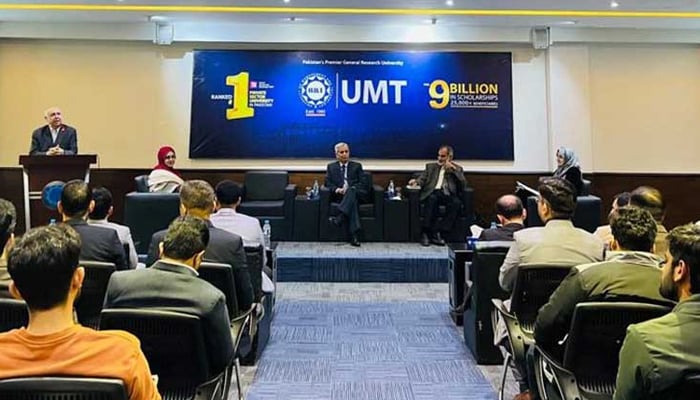Book on maritime affairs launched
Islamabad : A coordinated national effort is essential to exploit and safeguard the inherent potential of Pakistan’s maritime domain and coastlines. The Pakistan Navy upholds collaboration in its international dealings; the same must also be demonstrated internally to protect the oceans and unlock the potential of the blue economy.
This was highlighted by speakers at the book launch ceremony of Maritime Security: Challenges & Responses in a Changing World, authored by Vice Admiral (r) Iftikhar Ahmed Rao, Special Assistant to Prime Minister for Maritime Affairs, and published by IPS Press, the publishing arm of the Institute of Policy Studies (IPS).
The event was organized by IPS in coordination with the University of Management and Technology (UMT), Lahore, at the university’s campus.
The gathering was addressed by Khalid Rahman, chairman, IPS, Lt. Gen (r) Javed Hassan, acting president, UMT, Vice Admiral (r) Iftikhar Ahmed Rao, the author of the book, Dr Maliha Zeba Khan, assistant professor, NUML, Islamabad, and Dr Fatima Sajjad, head, Department of Political Science and International Relations, UMT.
The speakers observed that the book provides a comprehensive look at the multifaceted domain of maritime security. It unravels the historical background of the maritime sphere while navigating the evolution of the concept of maritime security, old and emerging sea challenges, and solutions that define this evolving landscape. Furthermore, the book explores the maritime security strategies of various regions and countries. It also discusses Pakistan’s maritime aspects and the contours of maritime economic and military security strategies.
The speakers were of the view that the book is poised to establish itself as an important guide covering all aspects of maritime security. They recommended it as an indispensable reference source for academics, policymakers, and students as it meticulously comprehends the nuances of maritime security and provides a thorough understanding through different perspectives.
Introducing the book, Rao underscored that although the maritime realm has long been the foundation of global power and international trade, it is frequently ignored. In Pakistan, this disregard for maritime matters and maritime security has contributed to the underdevelopment of coastal communities as well as hindered the realization of enormous prospects offered by the seas. The lack of research, infrastructure, and entrepreneurial attention given to the maritime sector has only added to the problem and hindered the country’s efforts to fully utilize its vast coastline.
He further maintained that nations face a multitude of challenges at sea, from piracy, illegal fishing, marine environment, and marine terrorism to trafficking in humans, drugs and firearms. These challenges underscore the vulnerability of societies and states and demand the global community to act against them in unison. As the book suggests, the response to such challenges should involve a cooperative strategy based on pragmatism and professionalism. In this regard, this work discusses the maritime security paradigms of global powers, such as the European Union, the UK, the USA, China, and India, while accentuating maritime economic and maritime military security policy of Pakistan and the robust professionalism of Pakistan Navy in the face of maritime adversity.
-
 Hilary Duff Opens Up About Marriage Fears Despite Strong Bond With Matthew Koma
Hilary Duff Opens Up About Marriage Fears Despite Strong Bond With Matthew Koma -
 ‘Grey’s Anatomy’ Star Eric Dane Breathes His Last At 53
‘Grey’s Anatomy’ Star Eric Dane Breathes His Last At 53 -
 Donald Trump Breaks Silence On Andrew’s Arrest: ‘It’s A Shame’
Donald Trump Breaks Silence On Andrew’s Arrest: ‘It’s A Shame’ -
 DJ Khaled Shares Weight Loss Progress
DJ Khaled Shares Weight Loss Progress -
 Jennifer Aniston And Jim Curtis Share How They Handle Relationship Conflicts
Jennifer Aniston And Jim Curtis Share How They Handle Relationship Conflicts -
 Shamed Andrew Real Birthday Plans As Cops Showed Up At Door
Shamed Andrew Real Birthday Plans As Cops Showed Up At Door -
 Pete Davidson’s Girlfriend Elsie Hewitt Says 'everything Hurts' After Sudden Medical Emergency
Pete Davidson’s Girlfriend Elsie Hewitt Says 'everything Hurts' After Sudden Medical Emergency -
 Princess Beatrice 17 Holidays Per Year Exposed Amid Andrew Arrest
Princess Beatrice 17 Holidays Per Year Exposed Amid Andrew Arrest -
 Who Is 'Queen Of Woke'? UK First Female Civil Head
Who Is 'Queen Of Woke'? UK First Female Civil Head -
 Dwayne Johnson Confesses What Secretly Scares Him More Than Fame
Dwayne Johnson Confesses What Secretly Scares Him More Than Fame -
 Elizabeth Hurley's Son Damian Breaks Silence On Mom’s Romance With Billy Ray Cyrus
Elizabeth Hurley's Son Damian Breaks Silence On Mom’s Romance With Billy Ray Cyrus -
 Shamed Andrew Should Be Happy ‘he Is Only In For Sharing Information’
Shamed Andrew Should Be Happy ‘he Is Only In For Sharing Information’ -
 Daniel Radcliffe Wants Son To See Him As Just Dad, Not Harry Potter
Daniel Radcliffe Wants Son To See Him As Just Dad, Not Harry Potter -
 Apple Sued Over 'child Sexual Abuse' Material Stored Or Shared On ICloud
Apple Sued Over 'child Sexual Abuse' Material Stored Or Shared On ICloud -
 Nancy Guthrie Kidnapped With 'blessings' Of Drug Cartels
Nancy Guthrie Kidnapped With 'blessings' Of Drug Cartels -
 Hailey Bieber Reveals Justin Bieber's Hit Song Baby Jack Is Already Singing
Hailey Bieber Reveals Justin Bieber's Hit Song Baby Jack Is Already Singing




